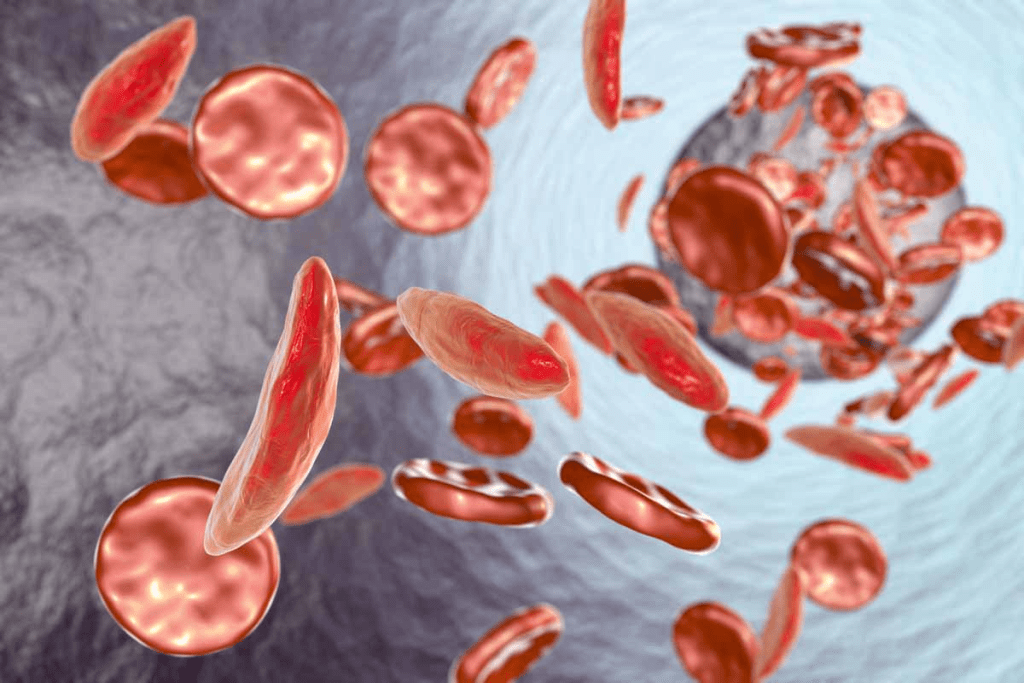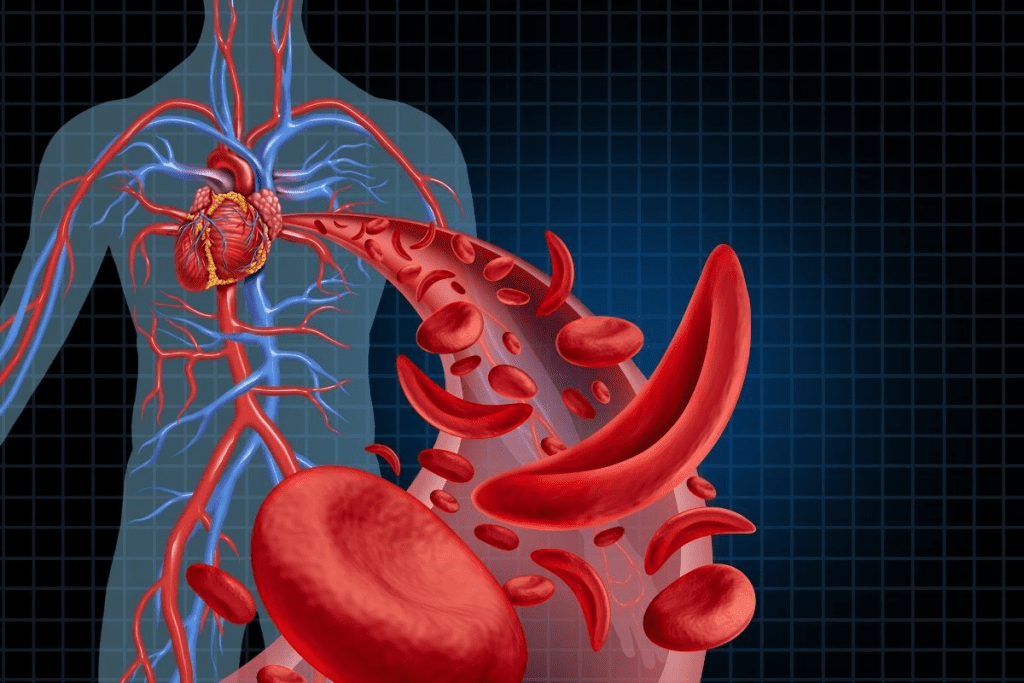For those with sickle cell disease, staying properly hydrated is essential because hydration important in sickle cell crisis helps prevent the dehydration of red blood cells, which lowers the risk of sickling and painful vaso-occlusive episodes. Drinking enough fluids supports blood flow and reduces the likelihood of complications during a crisis. Proper hydration maintains red blood cell integrity, decreasing blood viscosity and the chances of crisis triggers. Therefore, ensuring adequate fluid intake plays a pivotal role in managing sickle cell crises and improving overall health outcomes for patients.

Studies prove that staying hydrated is vital for health. It helps cut down on pain crises in sickle cell patients. Drinking enough water can make life better for those with this condition.
Key Takeaways
- Proper hydration helps prevent red blood cell dehydration.
- Adequate fluid balance reduces the risk of sickling and vaso-occlusive episodes.
- Drinking enough fluids maintains overall body health.
- Hydration is essential for managing sickle cell disease.
- Staying hydrated can improve the quality of life for individuals with sickle cell disease.
Understanding Sickle Cell Disease and Crisis
Sickle cell disease is a genetic disorder that affects hemoglobin production. It leads to abnormal hemoglobin, known as hemoglobin S (HbS). This causes health issues, including vaso-occlusive crises, which are key symptoms.

The Pathophysiology of Sickle Cell Disease
The disease’s cause is a genetic mutation that changes hemoglobin. This change makes red blood cells sickle and get stuck in small blood vessels. This is what causes a vaso-occlusive crisis.
The genetic issue behind sickle cell disease is a mutation in the HBB gene. This gene codes for the beta-globin part of hemoglobin. The mutation leads to HbS, which sickles under low oxygen.
What Triggers a Sickle Cell Crisis
Many things can start a vaso-occlusive crisis in those with sickle cell disease. These include:
- Dehydration, which makes blood thicker and more likely to sickle
- Infection, which can cause inflammation and increase the risk of a crisis
- Stress, both physical and emotional, which can trigger a crisis
- Extreme temperatures, either hot or cold, can affect blood flow and trigger a crisis
Knowing what triggers these crises is key to managing sickle cell disease and avoiding vaso-occlusive crises.
Why is Hydration Important in Sickle Cell Crisis
Hydration is key in managing a sickle cell crisis because hydration important in sickle cell crisis helps lower the risk of serious problems. When people with sickle cell disease drink enough water, they can lessen the severity and frequency of these crises. Not drinking enough water can make blood thicker, which causes red blood cells to sickle. Drinking enough water keeps blood flowing well, making crises less likely. We’ll look into how this works and why hydration important in sickle cell crisis is so important for effective management of the condition.
The Scientific Mechanism Behind Hydration Benefits
Sickle cell disease makes red blood cells sickle when they get stuck together. Not drinking enough water makes this worse by making the sickle cells more likely to stick together.
Drinking water helps by making the sickle cells less likely to stick together. It also helps blood flow better, which lowers the chance of crises.
Research Evidence Supporting Hydration’s Role
Many studies show how important water is for sickle cell disease. People who drink enough water have fewer and milder crises than those who don’t.
How Dehydration Worsens Sickle Cell Complications
It’s important to know how dehydration affects sickle cell disease because hydration important in sickle cell crisis plays a crucial role in disease management. Dehydration can make the disease worse by causing changes in the body that increase the severity of symptoms and complications.
Increased Blood Viscosity and HbS Polymerization
Dehydration makes blood thicker, which is bad for sickle cell disease. When we lose fluids, our blood gets more crowded. This makes it harder for blood to flow and can cause red blood cells to change shape.
“Dehydration is a major trigger for sickling”. Keeping well-hydrated is key to stopping this change.
The change in red blood cells is a big problem in sickle cell crises. It can block small blood vessels and cause pain. Dehydration makes this problem worse by making blood thicker and reducing its volume.
Higher Risk of Hospital Admissions and Symptom Severity
Dehydration makes sickle cell disease symptoms worse. It also means patients are more likely to need to go to the hospital. Dehydration can cause more and worse pain crises, which are a big reason for hospital visits.
Dehydration also raises the risk of other serious problems, like acute chest syndrome and stroke.
“Adequate hydration is essential to prevent these complications and to manage the disease effectively.”
So, staying hydrated is a key part of managing sickle cell disease. It helps reduce how often and how bad crises are.
Preventing Red Blood Cell Sickling Through Proper Hydration
Drinking enough water is key to stopping red blood cell sickling in people with sickle cell disease. We’ll look at how water keeps red blood cells healthy and see the proof it works.
Mechanism of Hydration in Maintaining Red Blood Cell Shape
Drinking enough water helps keep the right amount of fluid in the body, which is why hydration important in sickle cell crisis cannot be overstated. This makes red blood cells flexible and keeps them from sickling. Drinking enough water makes blood less thick, which lowers the chance of red blood cells sickling. When we drink enough, our blood vessels can handle red blood cells better, cutting down on pain crises. Hydration stops sickling by controlling blood thickness and keeping red blood cell membranes strong. Not drinking enough water makes blood thicker, which can cause sickling. Drinking enough water helps people with sickle cell disease avoid these problems.
Evidence-Based Benefits of Adequate Fluid Intake
Many studies show that drinking enough water is vital for sickle cell disease. Research shows that hydrated patients have fewer pain crises and other sickle cell problems. This evidence proves hydration helps reduce vaso-occlusive episodes and improves health outcomes.
Also, staying hydrated is a simple but powerful way to manage sickle cell disease. Doctors often suggest drinking more water as part of treatment. By focusing on hydration, we help people with sickle cell disease manage their condition better.
Reducing Vaso-Occlusive Episodes and Organ Damage
Drinking enough water is key to reducing vaso-occlusive episodes and organ damage. We’ll see how staying hydrated improves blood flow and protects vital organs in sickle cell disease patients.
How Hydration Improves Blood Flow
Hydration is vital for blood viscosity. When we drink enough water, blood flows better. This reduces the chance of red blood cells sickling and causing crises.
Drinking water dilutes hemoglobin S, making it harder for red blood cells to deform. This lowers the risk of vaso-occlusive episodes.
Also, staying hydrated keeps blood vessels flexible. This flexibility is key to preventing blood vessel blockages. It helps avoid tissue ischemia and organ damage.
Protecting Vital Organs Through Proper Fluid Balance
Keeping fluid balance right is key to protecting vital organs. Organs like the kidneys, liver, and lungs are at high risk. Drinking enough water can greatly reduce the risk of organ damage.
Hydration also helps prevent acute chest syndrome, a serious condition. Enough fluid keeps the lungs working well. This reduces the risk of respiratory failure.
Practical Hydration Guidelines for People with Sickle Cell Disease
Hydration is key in managing sickle cell disease. It helps prevent crises by making blood flow better. People with sickle cell should follow a hydration plan that fits their needs.
Daily Fluid Intake Recommendations
Those with sickle cell disease should drink at least 3 liters of water a day. Drinking more water can help lessen the severity of crises. It’s better to drink water all day, not just in big gulps.
Here are some tips to drink enough water:
- Drink a glass of water as soon as you wake up.
- Carry a water bottle with you all day.
- Add lemon, lime, or cucumber slices to your water for taste.
- Check your urine; it should be pale yellow or clear.
Strategies for Maintaining Proper Hydration
Drinking enough water is just part of staying hydrated. You also need to listen to your body and adjust your plan as needed. For example, you might need more water in hot weather or when you’re active.
Here are more strategies to stay hydrated:
- Make drinking water a part of your daily routine.
- Know how your medications might affect your hydration.
- Change how much water you drink based on your activity and the weather.
By following these hydration tips, people with sickle cell disease can manage their condition better. Remember, staying hydrated is a big part of their care. Staying informed is also very important.
Conclusion: Hydration as a Cornerstone of Sickle Cell Management
Hydration is key in managing sickle cell disease. It’s very important. We’ve looked at how sickle cell disease works and how staying hydrated helps avoid crises.
Keeping well-hydrated helps people with sickle cell disease a lot. It lowers the chance of serious problems and makes life better. Drinking enough water is essential, with experts saying at least 3 liters a day is needed.
Staying hydrated is vital for sickle cell disease management. By focusing on hydration, those with SCD can handle their condition better. This can also cut down on hospital visits and how bad symptoms. Hydration is a big part of a complete care plan for sickle cell disease.
FAQ
Why is hydration so important for people with sickle cell disease?
For those with sickle cell disease, staying hydrated is key. It helps prevent red blood cells from dehydrating. This reduces the chance of sickling and painful episodes. Keeping the body hydrated is a vital part of managing the disease.
What triggers a vaso-occlusive crisis in sickle cell disease?
Several things can trigger a crisis in sickle cell disease. These include dehydration, stress, and infections. Knowing what can trigger a crisis is important for managing and preventing them.
How does hydration help prevent vaso-occlusive crises?
Drinking enough water helps prevent crises by making blood less thick. This makes it harder for red blood cells to sickle. Studies show that staying hydrated is a key part of managing sickle cell disease.
What are the consequences of dehydration in sickle cell disease?
Dehydration can make sickle cell disease worse. It makes blood thicker and encourages sickling. This can lead to more severe symptoms and even hospital stays.
How does hydration maintain red blood cell shape and prevent sickling?
Drinking enough water keeps red blood cells properly shaped. This stops them from dehydrating and getting sick. It’s a key way to manage sickle cell disease.
What are the benefits of adequate fluid intake for individuals with sickle cell disease?
Drinking enough water can lower the risk of pain crises. It’s a proven way to manage sickle cell disease. It’s recommended by experts.
How does hydration improve blood flow and reduce the risk of vaso-occlusive episodes?
Drinking water makes blood flow better by making it less thick. This reduces the risk of blockages and damage to organs. Keeping fluid levels balanced is vital for organ health.
What are the daily fluid intake recommendations for individuals with sickle cell disease?
People with sickle cell disease should drink at least 3 liters of fluid a day. But this can change based on personal needs and situations.
What strategies can help maintain proper hydration for individuals with sickle cell disease?
To stay hydrated, drink water all day. Also, keep an eye on how much fluid you’re taking in. Adjust your plan as needed, depending on how active you are and the weather.
How can dehydration impact kidney function in individuals with sickle cell disease?
Dehydration can harm kidney function in people with sickle cell disease. It makes blood more concentrated, leading to sickling and kidney damage. Drinking enough water is key to keeping kidneys healthy.
Can hydration help prevent acute chest syndrome in sickle cell disease?
Yes, staying hydrated is important in preventing acute chest syndrome. This serious condition is a complication of sickle cell disease. Drinking enough water helps keep fluid levels balanced and reduces the risk of this condition.
References
- Okomo, U., Owusu-Ofori, S., & Alhassan, S. (2017). Fluid replacement therapy for acute episodes of pain in sickle cell disease. Cochrane Database of Systematic Reviews.


































